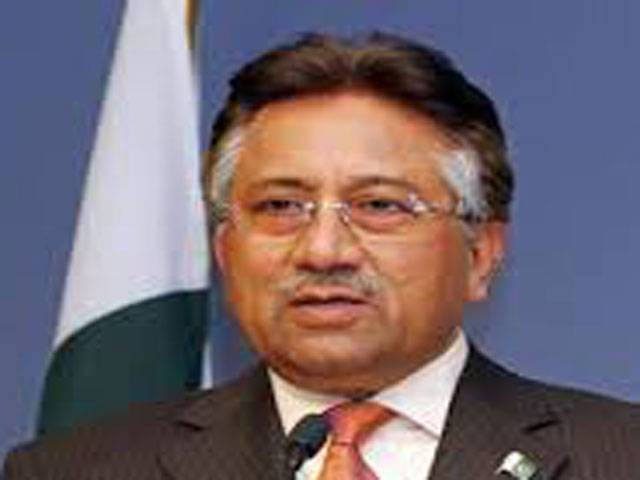ISLAMABAD - The Special Court Friday dismissed former President and ex-COAS Pervez Musharraf’s application for supply of additional documents and fixed 17th June as next hearing of the case for recording of evidence.
The Sindh High Court on Thursday last ordered the removal of Musharraf’s name from the Exit Control List (ECL) but had suspended this order for around two weeks, giving the federal government time to appeal against the decision.
A three-judge Special Court presided over by Justice Faisal Arab had reserved the judgement on June 5, which was announced by Registrar Abdul Ghani Soomro. “The application in hand has been filed at a stage, which is premature for the exercise of the powers (by the court),” the 11-page order said. The order added that the accused shall, however, be at liberty to seek production of the documents during the course of evidence and it would be for the court to decide as to whether such documents ought to be produced for a just decision of the case.
It also said that the process of evidence is yet to start and the right of the accused (Musharraf) to enter upon his defence is still available to him, therefore, there is no need for an order as prayed at this stage.
Musharraf’s counsels have filed an application 21/2014 for additional documents including minutes of the 44th session of the National Assembly dated 7.11.2007, list of the cabinet members, including advisors and attorney general for Pakistan, governors, chief ministers, chief secretaries, home secretaries, inspector generals of police, members of the cabinet and provincial assemblies of all the four provinces, and the copy of the notification that replaced Musharraf with Kayani as COAS and the letter written by then PM Shaukat Aziz to the then president before imposing emergency. They also demanded the lists of all those persons visited Musharraf in the President House and the Army House Rawalpindi from 1st July 2007 to 3rd November 2007.
Farogh Naseem, counsel of ex-president, had argued that they needed these documents because Musharraf had acted on the advice of the then prime minister and the cabinet and consulted the persons mentioned in the proclamation of emergency. He said therefore all the persons who acted as abettors or collaborators should also be tried in this case.
The court in its order on 7th March 2014 had said: “The involvement of any other person would depend on the evidence, which would come on the record.”
Contrary to that Akram Sheikh, prosecutor, argued that Musharraf had imposed emergency as chief of army staff on 3rd November without any summary from the PM House. He said that the cabinet never met to discuss the imposition of emergency, which in fact was unilateral act of the accused.
The prosecutor also said that the allegation of concealment of the documents and the plea that others ought to have also been implicated in the case would solely depend on the evidence. His stance was that the required documents are covered by the term public documents; therefore, certified copies can be obtained directly from the concerned departments.
The Court order said if the defence application is decided in terms as prayed for, the decision would be contrary to its earlier orders dated 07-03-2014 and 08-05-2014 wherein it was said that the involvement of any other person would depend after recording of evidence.
The court said that the evidence of the prosecution is yet to start, the relevant stage is yet to come and as soon the stage arrives there would be no bar, either on the court or on the accused, in exercise of its powers or his rights available under Sections 94 and 540 of CrPc and Article 161 of Qanoon-e-Shahadat Order 1984.
Tuesday, April 16, 2024
Musharraf’s plea for addl documents rejected
High treason case

Caption: Musharraf’s plea for addl documents rejected
IHC dismisses Bushra Bibi's plea seeking her shifting to Adiala Jail from Bani Gala
4:25 PM | April 16, 2024
Punjab CM visits Tehsil Headquarter Hospital Murree
3:25 PM | April 16, 2024
High-level Saudi delegation in Islamabad to hold meetings with Pakistani leadership
2:07 PM | April 16, 2024
Saudi foreign minister meets PM Shehbaz Sharif
1:17 PM | April 16, 2024
Decision to retaliate against Iran attacks rests with Israel, says Pentagon
1:05 PM | April 16, 2024
Political Reconciliation
April 16, 2024
Pricing Pressures
April 16, 2024
Western Hypocrisy
April 16, 2024
Policing Reforms
April 15, 2024
Storm Safety
April 15, 2024
Democratic harmony
April 16, 2024
Digital dilemma
April 16, 2024
Classroom crisis
April 16, 2024
Bridging gaps
April 16, 2024
Suicide awareness
April 15, 2024
ePaper - Nawaiwaqt
Advertisement
Nawaiwaqt Group | Copyright © 2024





